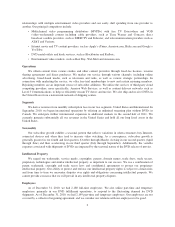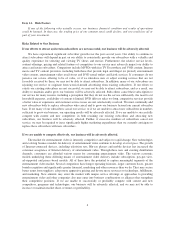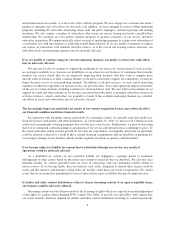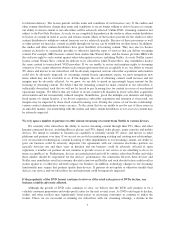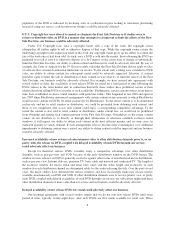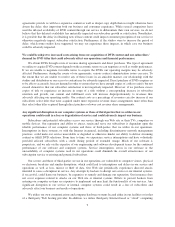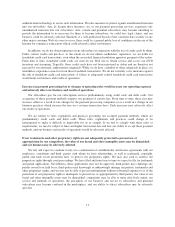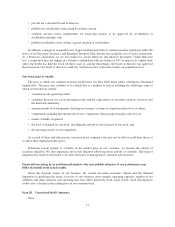NetFlix 2010 Annual Report Download - page 14
Download and view the complete annual report
Please find page 14 of the 2010 NetFlix annual report below. You can navigate through the pages in the report by either clicking on the pages listed below, or by using the keyword search tool below to find specific information within the annual report.The adoption of any laws or regulations that adversely affect the growth, popularity or use of the Internet,
including laws limiting Internet neutrality, could decrease the demand for our subscription service and increase
our cost of doing business. For example, in late 2010, the Federal Communications Commission adopted
so-called net neutrality rules intended, in part, to prevent network operators from discriminating against legal
traffic that transverse their networks. The rules are likely to be subject to interpretation and legal challenge. To
the extent, that these rules are interpreted to enable network operators to engage in discriminatory practices or are
overturned by legal challenge, our business could be adversely impacted. As we expand internationally,
government regulation concerning the Internet, and in particular, network neutrality, may be nascent or
non-existent. Within such a regulatory environment, coupled with potentially significant political and economic
power of local network operators, we could experience discriminatory or anti-competitive practices that could
impede our growth, cause us to incur additional expense or otherwise negatively affect our business.
Changes in how network operators handle and charge for access to data that travel across their networks
could adversely impact our business.
We rely upon the ability of consumers to access our service through the Internet. To the extent that network
operators implement usage based pricing, including meaningful bandwidth caps, or otherwise try to monetize
access to their networks by data providers, we could incur greater operating expenses and our subscriber
acquisition and retention could be negatively impacted. For example, in late 2010, Comcast informed Level 3
Communications that it would require Level 3 to pay for the ability to access Comcast’s network. Given that
much of the traffic being requested by Comcast customers is Netflix data stored with Level 3, many
commentators have looked to this situation as an example of Comcast either discriminating against Netflix traffic
or trying to increase Netflix’s operating costs. Furthermore, to the extent network operators were to create tiers of
Internet access service and either charge us for or prohibit us from being available through these tiers, our
business could be negatively impacted.
Most network operators that provide consumers with access to the Internet also provide these consumers
with multichannel video programming. As such, companies like Comcast, Time Warner Cable and Cablevision
have an incentive to use their network infrastructure in a manner adverse to our continued growth and success.
While we believe that consumer demand, regulatory oversight and competition will help check these incentives,
to the extent that network operators are able to provide preferential treatment to their data as opposed to ours, our
business could be negatively impacted.
Privacy concerns could limit our ability to leverage our subscriber data and our disclosure of or
unauthorized access to subscriber data could adversely impact our business and reputation.
In the ordinary course of business and in particular in connection with merchandising our service to our
subscribers, we collect and utilize data supplied by our subscribers. We currently face certain legal obligations
regarding the manner in which we treat such information. Other businesses have been criticized by privacy
groups and governmental bodies for attempts to link personal identities and other information to data collected on
the Internet regarding users’ browsing and other habits. Increased regulation of data utilization practices,
including self-regulation or findings under existing laws, that limit our ability to use collected data, could have an
adverse effect on our business. In addition, if unauthorized access to our subscriber data were to occur or if we
were to disclose data about our subscribers in a manner that was objectionable to them, our business reputation
could be adversely affected, and we could face potential legal claims that could impact our operating results.
Our reputation and relationships with subscribers would be harmed if our subscriber data, particularly
billing data, were to be accessed by unauthorized persons.
We maintain personal data regarding our subscribers, including names and, in many cases, mailing
addresses. With respect to billing data, such as credit card numbers, we rely on licensed encryption and
12


